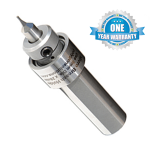Product Description
Static Broach Holder Features:
20mm Shank Diameter
Accepts 8mm (.315″) Diameter x 1-1/4″ Length Punch-Style Broaches
Can be mounted into a punch press or milling machine for accurate, light duty pecking or punching operations
Adjustment Free Design Minimizes Set-Up Time
Static Broach Holder Uses:
1. The static rotary broach holder can be mounted into a punch press or milling machine for accurate, light duty pecking or punching operations.
2. Multiple static holders can be used in place of a conventional broach. Conventional broaches have multiple teeth that increase in size. Single or multiple static broach holders can be used with different broaches that increase in size until the desired form is achieved.
3. The static holder can be used for shaping type operations. Shaping machines remove a small amount of material in a given direction in multiple swift passes. A static broach holder can also be used as a shaping tool. For example, a square rotary broach could be used to cut a small section of a keyway or rectangle in multiple passes until the full form is achieved.
4. Alignment. Rotary broach tools do not often include alignment features. The static broach holder is fixed and will hold alignment for each pass.
5. The static broach holder can be used to create forms in tough materials. Many hexalobular, or ‘torx-type’ forms can be pecked into tough materials where rotary broaching tools may fail. Many titanium bone screws are manufactured using the following procedure:
a. Drill the pilot hole.
b. Peck the broach into the pilot hole using the static holder .010-.025” deep.
c. Remove the broach from the part, drill the chips out.
d. Repeat as needed.
If this pecking method is still unsuccessful, partial forms can be made, and then indexed to machine the final form. For example, a broach with two of six hexalobular lobes can be pecked into the pilot hole, removed, rotated, and repeated until the full form is achieved. For more information, please see ‘Improved Process for Medical Implant Broaching’





